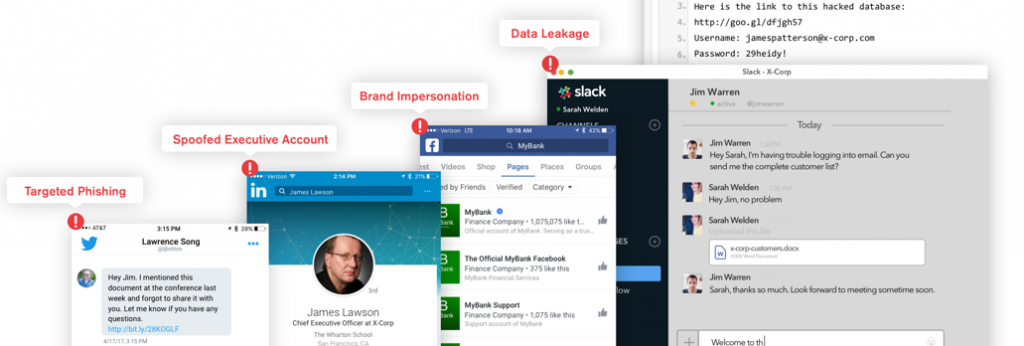Social Media Protection Software: 5 Best to Try Out
Keep your social media accounts protected and use reliable tools
7 min. read
Updated on
Read our disclosure page to find out how can you help Windows Report sustain the editorial team Read more
Key notes
- Almost any user connected to the Internet has at least one social media account. Learn about the risks and how to protect your online presence.
- We recommend having strong passwords, using a good antivirus, and limiting access to user accounts. More details can be found in the article.
- See below a rundown on how to protect your device and online presence with these products and what to look for in social media protection software.

Social media started out as a new way for people to connect and share their life experiences.
In time, it has evolved into big platforms that offer a way to consume news (Twitter), create fan communities (Facebook), search for a job (LinkedIn), create and promote your own brand (Instagram), and so much more.
This means that keeping your accounts secure is more important than ever.
Whether you are a person or a business, there are tools you can use to lower the risks of damaging your own image or losing access to your social media accounts.
From free tools to premium solutions that cost a pretty penny, here’s how to choose the right one for your needs.
How can I protect your privacy on social media? [Best tools]
1. Use a password management tool
You don’t want a cybercriminal to take over your online identity and steal all of your personal information. However, social media is a vulnerability through which hackers may gain access to all of this.
There are several tools out there that can help keep your online accounts safe, and the one that got our attention, particularly in this case is RoboForm.
Make your passwords unique and tough to guess, and save them securely with the RoboForm application.
Thus, benefit from this free trial service to encrypt all passwords online and also consider the premium plans to sync up all your devices.
Furthermore, with this trustworthy password manager for social media accounts, you won’t have to remember where you placed your passwords because everything is in one place, safe on the cloud.
Password managers frequently provide supplementary security measures in addition to an encrypted vault. For example, RoboForm allows you to autofill and autosave passwords while you’re browsing the internet.

RoboForm
Have social media passwords encrypted and hidden with this full-featured manager.2. Covering the basics: social login security
The most important aspect of the security of an online account is the login password. Many people choose a very weak password, so it’s best to begin there. A good rule of thumb is to make it as long as possible – aim for at least 12 characters.
Most social networks will ask you to use at least one upper case letter, one number, and one special character, but in reality, it’s just better to aim for a lengthy password that you can easily remember.
You can find tools that can help you generate secure passwords, but you’ll have to keep those safe.
Password Managers are growing in popularity, and they provide a lot of convenience and security in both free and paid versions.
Notable examples are LastPass, Enpass, Dashlane, RoboForm, and 1Password, but there’s no shortage of options out there.
A password manager will also do the remembering for you. You will only have to use a master password, which is the key to a vault where all the login details are stored encrypted.
Paid versions analyze the strength of your passwords, and notify you to change them if a service has been hacked.
Lastly, make sure to use multi-factor authentication whenever possible, as it’s free and easy to set up using a mobile phone and QR codes.
Popular tools like Google Authenticator, LastPass Authenticator, and Microsoft Authenticator will provide you with a one-time security code every time you log in on a new device, ensuring you’re the real owner of that account.
3. Use an antivirus to avoid scams and phishing
If you’re not already using an antivirus on your Windows PC, we strongly recommend you do. Dedicated tools are more robust and capable than the built-in Windows Defender.
In short, online threats have only grown with the rise of social media. In turn, the antivirus has evolved to match the increased complexities of online security.
Good antiviruses with high detection rates protect your computer in real-time. They have built-in vulnerabilities detectors that always run in the background.
They can send quick notifications whenever they detect suspicious activity such as an unsafe Wi-Fi network that may monitor your online endeavors.
Modern-day antiviruses are generally light and configured to be as non-intrusive as possible, whilst still providing top-level security.
Many of them can also detect whether there are any problems in your system such as missing security updates for your OS and software.
This way, you can rest assured that rogue software will not take control of your computer and use the social media accounts that you are connected to in order to spread malware to your friends.
4. Taking it to the next level with cloud protection
Perhaps you are a parent looking to keep your children safe online. You may be interested in filtering the content they find on social media and protecting them from cyber-bullying and stalking.
There are many options available, and choosing between them can get a little confusing. But let’s talk about what might be the best – even if it’s not exactly the cheapest.
Net Nanny is a great internet filtering tool, which greatly reduces profanity and blocks adult sites. It also has a social component, designed specifically to monitor children’s activity on popular sites.
This includes Facebook, Twitter, and Tumblr, among others. From instant messaging to image and video posting, Net Nanny Social records everything – even what friends are doing.
Parents have access to a dashboard where they can see an overview of their kids’ activities. This includes the current threat level for stalking and bullying.
You’ll get notified by SMS only when action is necessary, and there’s no need for any software installation. This is a cloud-based service, which means you can set up and do everything from the comfort of your browser.
5. Cloud protection is a must for business owners
If you own a business, managing your always-on social media presence is very important.
Protecting your brand image isn’t just about what happens on your official pages, but also about making sure you track what your employees are doing on their pages.
A simple bad tweet can do irreparable damage, but there are ways to reduce these risks to a minimum.
One good example is Hootsuite, which is great even for professionals who work alone.
This cloud service allows you to do monitoring, analytics, engagement, and security in one package. Security is actually provided via a platform called Zerofox, which integrates seamlessly with your Hootsuite stream.
It works great with content curation software. Using these tools will help you set an approval system for social posts. This will give you control of the level of access for each user, and flag sensitive content.
On top of that, you get automated protection against hijacking. Nothing is worse than brand impersonation or having an executive lose control of their social media account.
A good rule of thumb is that security is only as good as the weakest link. Attackers have devised ways to piece together the information they need by targeted phishing, which can translate into data leaks.
In today’s fast-moving world, using a service like Hootsuite is just as important as having a contingency plan.
These are our top suggestions when it comes to social-media security tools. We hope we helped you establish a good system. If you have any questions or suggestions, feel free to use the comment section below.
If you want more suggestions, the articles in the Software Hub will help you stay ahead in this game of protecting your personal information as much as possible.
If you are interested in more advanced online security and privacy, check out the VPN Hub on our website.









